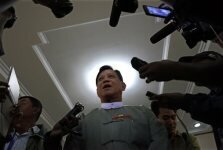After securing the safe seat of Havant on the south coast following Thursday’s General Election, Conservative Alan Mak said: “As a British-born MP of Chinese heritage, I appreciate this is significant for the [Chinese] community and look forward to engaging with them when I can.”
Throughout his campaign Mak had dismissed as naive the belief that his victory would give the UK’s third-largest ethnic group a political and vocal presence in the House of Commons.
The South China Morning Post understands Mak was advised to show more support to the UK’s Chinese community following his landmark victory by the Conservative Friends of the Chinese (CFOC), who are keen to promote his historic win.
“I also encourage more of the British Chinese community to join me in public life. I grew up in the UK, and I am blessed with the opportunities and values this country have given my family and me. I pay special tribute to my parents who instilled in me the values of hard work, enterprise and passion for community, a shared philosophy derived from both my British and Chinese heritage,” Mak was quoted as saying in the statement.
The 31-year-old was considered a shoo-in, with his constituency long considered a Conservative stronghold. He picked up 23,159 votes, increasing his share of the ballot compared with his predecessor, David Willetts, who stood down after 23 years.
Mak is the first Chinese Briton to be elected to the UK parliament in its 800-year history.
Director of CFOC, Jackson Ng, who failed in his own bid to become the MP for Liverpool Riverside, said: “I have known Alan for almost six years now and can say we are all very proud of his achievements in the Conservative Party over the past 16 years. We look forward to working more closely with him over the next few years.”
In all, 11 British Chinese ran for office in the election, with Mak the only victor.
Mak on the campaign trail. Photo: Peter Simpson
Liberal Democrats candidates Steven Cheung, Philip Ling and Alexander Payton, the Green Party’s James Chan, and Labour’s Sarah Owen and Rebecca Blake all lost in what proved to be shock second-term win for Prime Minister David Cameron’s Conservative Party.
The CFOC, which was given an office at Conservative Party HQ in London to marshal the Chinese vote in what was billed as a knife-edge election, fielded five candidates in all.
Xingang Wang, originally from Heilongjiang, stood in Manchester Central.
He said: “I really enjoyed this experience and I am happy to share my experience with those who are interested in politics. I want to see more and more British Chinese get involved in politics, support the Conservatives and join me for the next journey.”
Chongqing-born Edward Yi He, who stood in Aberavon, said: ‘As a foreign-born candidate at this General Election, the most valuable thing I have witnessed is the openness and inclusiveness our British society has.”
Had He succeeded, he would arguably have been the second most well-known politician to hail from Chongqing after disgraced mainland politician Bo Xilai.
British-born Chinese of Hong Kong parents, Mark Lim, a doctor, also failed in his bid to become a Conservative MP in London’s Islington South and Finsbury constituency.
The Conservative Party’s unexpected majority win confounded poll predictions that the vote would be the closest in decades. Instead, Cameron and his party was swept into office for another five years, with the main opposition party Labour and former coalition partner the Liberal Democrats both left in tatters.







